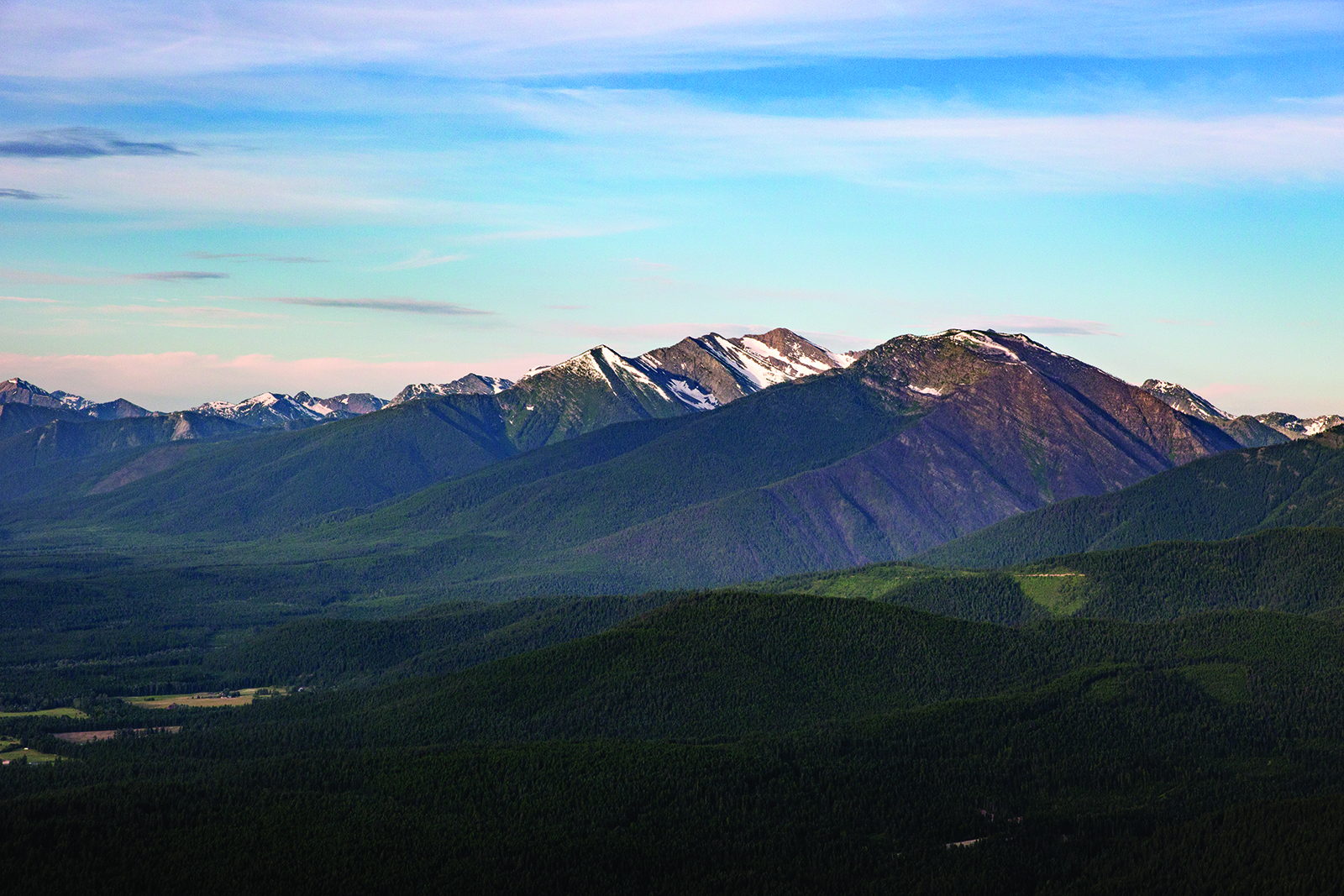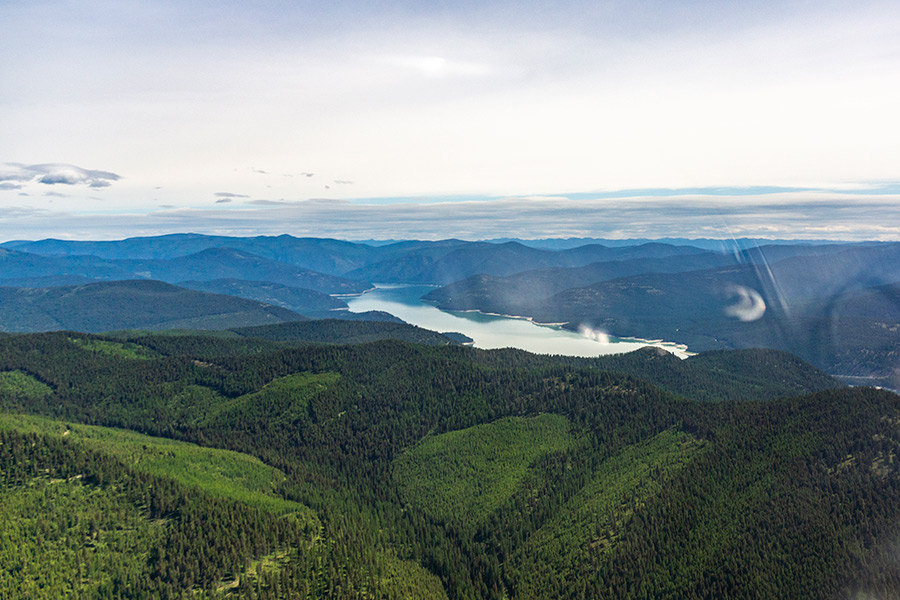Citing Climate Impacts and Grizzly Bear Mortality, Judge Halts Yaak Logging Project
The 95,412-acre Black Ram timber sale was proposed on a segment of the Kootenai National Forest that is home to the imperiled Cabinet-Yaak grizzly population
By Tristan Scott
Pointing to evidence that land managers failed to adequately consider the impacts of a 95,000-acre logging project both to global climate change and an isolated population of grizzly bears in northwest Montana, a federal judge on Thursday halted the Black Ram logging project in the Yaak Valley north of Troy.
The sprawling logging project has been beset by controversy since it was first proposed in July 2018, with high-profile conservation figures, including the author Rick Bass, arguing it shouldn’t move forward because it lacks effective safeguards to protect the region’s fragile grizzly population in the Cabinet-Yaak ecosystem, which includes a federally designated grizzly bear recovery zone. Conservation groups also argued the agencies overseeing the project didn’t consider the climate harm that would result from logging thousands of acres of old-growth forest, including clearcutting.
The U.S. Forest Service (USFS) first proposed the project in 2017. In June 2022 the Alliance for the Wild Rockies and the Native Ecosystems Council formally challenged it, filing their lawsuit in federal court in Missoula. The lawsuit names as defendants Keith Lannom, deputy regional forester for the USFS’ northern region; Chad Benson, the forest supervisor for the Kootenai National Forest; and Kirsten Kaiser, district ranger on the Three Rivers Ranger District of the Kootenai National Forest. The Kootenai Tribe of Idaho later joined the lawsuit as defendant-intervenors.
In the ruling, U.S. District Court Judge Donald W. Molloy found that the U.S. Fish and Wildlife Service (FWS) ignored population declines in the Cabinet-Yaak population of grizzlies, and that the USFS failed to address harms to grizzlies from illegal use of motorized vehicles. The court also found that the Forest Service failed to consider the climate harms of logging thousands of acres of forest that currently store carbon, in violation of the National Environmental Policy Act (NEPA).
Molloy rejected the USFS’s argument that the project would have an “infinitesimal” impact on climate change because young trees would eventually replace the carbon being stored in trees the project would cut down.
“Ultimately, removing carbon from forests in the form of logging, even if the trees are going to grow back, will take decades to centuries to re-sequester. Put more simply, logging causes immediate carbon losses, while re-sequestration happens slowly over time, time that the planet may not have,” Molloy wrote. “NEPA requires more than a statement of platitudes, it requires appraisal to the public of the actual impacts of an individual project. With all in agreement that climate change as a results of carbon emissions is an increasingly serious national and global problem, the USFS has the responsibility to give the public an accurate picture of what impacts a project may have, no matter how ‘infinitesimal’ they believe they may be. They did not do so here. Accordingly, the agency failed to take a ‘hard look’ at the project’s carbon emissions, violating NEPA.”
The project area encompassed 95,412 acres and included commercial harvest on 4,038 acres, as well as non-harvest fuel treatment on 7,553 acres. It called for building 3.3 miles of permanent roads and 0.2 miles of temporary roads; constructing fuel breaks on 76 acres; maintenance work on 90 miles of existing roads; and decommission work on 23 miles of road.
Molloy also sided with plaintiffs in their assertion that FWS violated the Endangered Species Act by failing to rely on the best available science in establishing an environmental baseline for grizzly bears in the project area.
“Ultimately, plaintiffs are correct because although the FWS explained its scientific reliance, it disregarded biological information indicating an increase in grizzly bear mortality,” Molloy wrote.
Conservation organizations hailed the ruling as victory for core grizzly bear habitat as well as climate.
“This ruling is a giant win,” Adam Rissien, ReWilding manager with WildEarth Guardians, said in a prepared statement. “It’s a win for mature and old growth forests because the court recognized their importance in storing carbon, a factor the Forest Service failed to properly consider. It’s also a win for the small population of grizzlies in the Yaak Valley, as the courts found recent deaths of female bears among this population cannot be ignored.”

Stretching from the Canadian border to the Yaak River, the Black Ram project also authorized clearcutting on an estimated 2,442 acres, 1,460 acres of additional commercial logging, 7,034 acres of burning, and 579 acres of logging in designated old growth forest – despite President Joe Biden’s mandate to conserve old growth forests on federal lands.
“This is a great win for the wild forests and grizzly bears of Montana’s spectacular Yaak Valley,” Ted Zukoski, a senior attorney at the Center for Biological Diversity, said in a prepared statement Friday morning. “This decision affirms that agencies can’t ignore the vulnerability of this small but critical population of grizzlies and can’t turn a blind eye to the climate harms of clearcutting mature forests.”

Mike Garrity, executive director of the Alliance for the Wild Rockies, said the thrust of his organization’s legal argument centers on the project’s reliance on new road construction in grizzly bear habitat, as well as the agency’s ineffective methods of closing and decommissioning roads upon the project’s completion.
“The bottom line is that the Cabinet-Yaak grizzly population is failing every recovery target and goal, so we are thrilled that we won our case,” Garrity said. “The Cabinet-Yaak grizzly population is failing the target for females with cubs; it is failing the target for distribution of females with cubs; it is failing the female mortality limit (which is 0 mortalities until a minimum of 100 bears is reached); and it is failing the mortality limit for all bears (also 0 mortalities until a minimum of 100 bears is reached). It’s long past time for the Forest Service to recover grizzly bears by protecting their habitat as required by law instead of destroying it.”
“It’s unfortunate we have to take the Forest Service to court to force it to follow the law, but it’s either that or watch the agency log and road the Cabinet-Yaak grizzly population into extinction,” Garrity added.